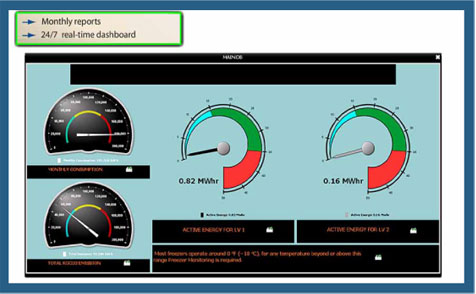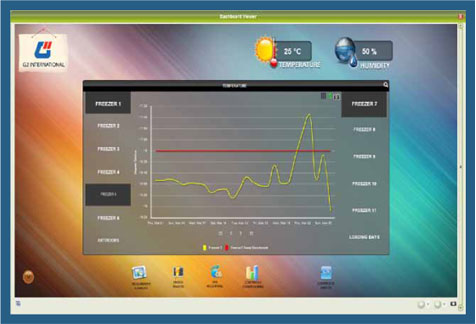
Cold Storage and Refrigeration
Real-time monitoring of status and alarms for freezer temperature, monitoring of defrosting cycle, remote alarm response by Gbots to identify faults, real-time data & reports on performance for informed decision making
Monitoring Cold Stores is Essential

Cold stores and refrigerators need continuous monitoring and alarms must be raised if the temperature is outside the specified range. How tightly the temperature needs to be controlled varies both with the type of food and the number of different foods being stored. Freezing extends storage life by slowing the physical changes and chemical and microbiological activity that cause deterioration. Although every product has an individual ideal storage temperature, most frozen food products are stored at between 0 to minus 30ºF. Over cooling reduces the efficiency of the freezer and may result in a raise in temperature, damaging product quality.
To maintain food quality, the speed of freezing must be controlled because the rate of temperature change influences physical changes, rates of microbiological activity and chemical reactions. As the freezer reduces the temperature of a product from ambient to storage level it changes most of the water in the product to ice. The freezing time determines the size of ice crystals produced which affects yield (dehydration), quality, nutritional value and sensory properties. In addition, the defrosting cycle must be managed. Frost on the evaporator will eventually build up to the point where it will restrict the air-flow causing a loss of refrigeration capacity. To prevent this, manufacturers provide a time clock, usually set to repeat every 6 or 8 hours, to initiate a defrost cycle. If defrosting fails this will affect the continuous and smooth operation of the cold storage.
Cold storage uses a significant amount of energy, which can be reduced by optimising the operation of the refrigerators.
Pacific Controls Managed Services for Cold Storage Facilities

Pacific Controls ICT Enabled Managed Services For Business Process Integration use an M2M data gathering panel at the cold storage facility to collect data from existing building and equipment management systems, in any protocol, and transfer it over the IP network to a central repository for data information management built on an industry standard open framework. The managed services offer continuous online monitoring of the cold store, reporting on consumption trends and measurement of equipment performance. The service provides anytime, anywhere access to information about the cold storage facility from laptops or handheld devices and sends alarms directly to the service team using SMS or email to ensure an immediate response to any significant change in temperature.
The solution is applicable at all stages of the food chain, from storage silos on farms, through processing and distribution storage to the retailer’s cold store and can be used to verify that the cold chain is not broken at any point. The use of M2M means that data from all these locations can be combined in a single database for in-depth analysis.
Pacific Controls operates a state-of-the-art GCCC that provides 24x7x365 customer support by providing remote monitoring and control of all electro-mechanical and security services at the customer’s facilities, thus reducing operational and energy costs and ensuring resources are used effectively. Continuous online surveillance measures the actual performance of refrigerators in the cold store, identifies any problems and provides benchmarking against international standards. Strategies to optimise performance can be implemented that will increase the life of the cold storage equipment and improve their operation.
Linking cold storage facilities to the GCCC provides:
- Real-time monitoring of status and alarms for freezer temperature
- Monitoring of the defrosting cycle
- Real-time data and regular reports on performance for informed decision making
- Pro-active surveillance that improves service delivery and ensures an accurate and prompt response to faults and equipment failures
- Holistic building management from a central control point, ensuring that all the building systems are optimised to work with the cold storage facilities
- Temperature and other operating data logged centrally and analysed to detect trends and predict equipment failures.
- Remote alarm response by Gbots to identify faults and fix them if possible. Full information can be forwarded to engineers if required.
Dashboards and reports are created to meet the users’ requirements and accessible to all authorised users over the web. Figure below is a typical dashboard showing freezer temperatures in real time. Compliance reports are generated automatically in the right format for the relevant authorities.
Benefits for Cold Storage Manufacturers
Using Pacific Controls Managed Services for Critical Assets Monitoring, suppliers of cold storage solutions can offer their customers monitoring and management services through a single interface that connects all the refrigeration equipment they have deployed, whether cold stores, fridges, freezers or refrigerated containers. They can offer predictive maintenance services to ensure that all their refrigeration units are serviced before they break down and emergency call-out services to ensure that food does not spoil in the unlikely event that a breakdown does occur.
This allows them to have an on-going relationship with their users and provides a central data depository for analysis that will enhance R&D.
Benefits for Cold Storage Users
Continuous real-time monitoring of refrigeration equipment, and other building systems in the cold store, enabling users to take immediate action if the temperature is too high or too low, ensures efficient and productive cold store operation by increasing uptime and reducing wastage of food and other goods. Optimising refrigerator and freezer performance reduces energy bills. The service also reduces the need for staff to monitor and log temperature variance. Proactive maintenance of the cooling system results in scheduled servicing and fewer emergency call-outs, which reduces costs as well as extending the life of compressors and refrigeration equipment
Real-time information is available for management to help inform more effective decision making, while reports for regulatory authorities are automatically prepared in the right format, ready for immediate submission.

